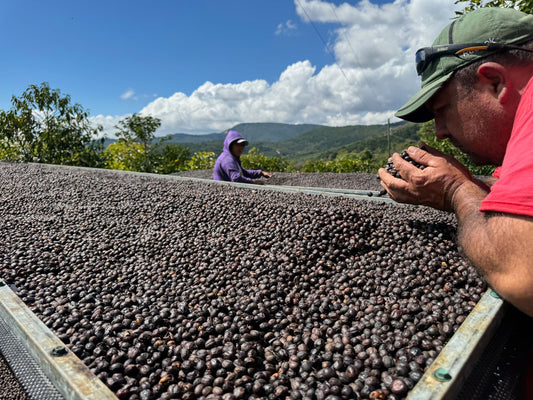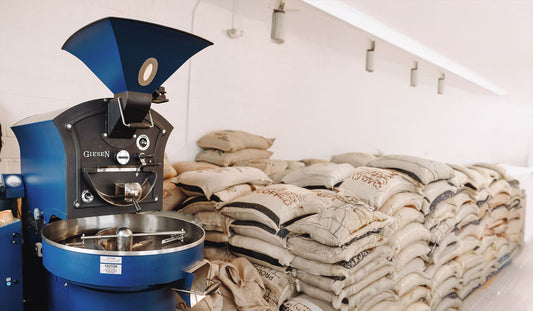Why are coffee prices so high? If you’ve been wondering why the cost of your favorite beans and beverages has been climbing, you’re not alone! All around the world, coffee enthusiasts and businesses alike are feeling the effects of recent price surges in both Arabica and Robust beans.
In December 2024, Arabica coffee hit its highest price since 1977. Robusta coffee also set and broke its own records in 2024, hitting and then surpassing its all-time high price multiple times in just one year. Unfortunately, this trend isn’t showing any signs of slowing.
So, why is coffee so expensive? Although there are numerous factors at play, climate change is undoubtedly the major driving force behind the recently high coffee prices. Combined with other industry issues, current market conditions have culminated in a perfect storm—literally and figuratively—for skyrocketing coffee costs.
Let’s explore the various factors that are pushing prices skyward.
1. Rainfall Patterns in Brazil
Brazil is the world’s top coffee-growing region, producing approximately 35% of the global supply. At least 70% of the country’s output is the Arabica variety. As such a significant player in the coffee game, problems with Brazil’s crops have major ramifications that reverberate worldwide.
So, why is their coffee so expensive? Erratic rainfall patterns in Brazil are playing a huge role. The previous all-time high in 1977 occurred when abnormal snowstorms wreaked havoc on Brazilian coffee plantations. Now, we’re seeing a similar occurrence, only this time, the devastation is being caused by drought and heavy rains.
In August and September of 2024, Brazil experienced the worst drought in 70 years. And, if that wasn’t enough, October brought unusually heavy rainfall.
The most obvious reason why coffee prices are so high is simply because so many farms failed to produce their usual yields. Coffee producers end up raising their rates out of necessity to stay afloat during uncertain times.
Why else is coffee so expensive? Rising prices are also driven by speculation. There’s a lot of concern that Brazil’s 2025 crops could meet a similar fate, and that uncertainty is increasing demand for coffee now, as today’s all-time high prices could be next year’s lows.
2. Inclement Weather in Vietnam
Vietnam is the world’s second-highest producer of coffee, and approximately 95% of its output is the Robusta variety. Just like in Brazil, problems in Vietnam are felt globally. However, in this case, it’s Robusta coffee’s price that’s affected.
Vietnam’s coffee output decreased by roughly 10% in 2024, and that number could easily keep climbing. Why is coffee so expensive in Vietnam? Just like Brazil, the country experienced severe drought followed by heavy rainfall, devastating many crops. The weather has been especially problematic in the Central Highlands, which is a major coffee-producing region of Vietnam.
3. Rising Temperatures Worldwide

Why are coffee prices so high if coffee is grown all around the world? Although Brazil and Vietnam are the biggest and most noteworthy coffee producers, the effects of climate change aren’t limited to those two countries.
Even the regions that haven’t experienced drought and/or heavy rainfall are experiencing disruptions directly caused by climate change. Rising temperatures are causing pest infestations, such as coffee nematodes, as well as plant diseases, like coffee leaf rust.
This is why coffee is so expensive: lower crop yields make coffee more scarce, and thus, more valuable. And, as suitable coffee-growing areas shrink, that still-suitable land becomes more valuable. It’s not just the consumers who are feeling the burn in their bank accounts.
4. Ominous Speculation
As previously mentioned, high coffee prices aren’t only tied to immediate conditions. Worry about coffee’s future also causes demand to spike.
The Intergovernmental Panel on Climate Change (IPCC) conducted a review that predicted that coffee-growing areas could decrease by up to 50% by 2050. Unless drastic steps are taken to mitigate the effects of climate change, this alarming prediction could easily become a reality over the next few decades. It’s no surprise that buyers are scrambling to stock up.
5. Worldwide Shipping Problems

Climate change is not the only reason why coffee is so expensive. Global shipping issues like port congestion and container shortages are causing supply chain disruptions and higher freight costs, and those expenses are often passed down to the end receiver.
The pricing issue comes down to the primary principle of economics: supply and demand. When coffee isn’t as readily available, some companies are willing to pay more for it, creating something like a bidding war. Major coffee chains need to keep their customers’ favorite products in stock, even if that means paying more, and in turn, charging the end consumers more to recoup losses.
6. Anti-Deforestation Regulations in Europe
If you’re wondering why coffee is so expensive, you can take solace in the fact that the dark cloud does have a silver lining. In some cases, high coffee prices are caused by environmental regulations—the EU Deforestation Regulation (EUDR), for example—that force coffee producers to prove that their beans aren’t linked to deforestation.
Although paying higher prices is never ideal, pushing for sustainable, eco-friendly practices is a good thing. In the long run, these types of environmental regulations should actually help to prevent rising prices by ensuring that coffee-producing regions aren’t destroyed by opportunistic operations that seek only to profit, even at the expense of local land and communities.
7. Corporate Greed
As you can see, there are multiple factors at play, and many of the reasons why coffee is so expensive are directly connected and end up exacerbating each other.
Despite expensive coffee prices, farmers are losing money due to reduced yields. They end up raising prices to compensate for their losses, and then the major coffee chains pass those extra costs on to end consumers, leading to higher retail prices. The unfortunate truth is that climate change is the driving force, but some may agree that corporate greed also plays a big role here.
Explore Our Sustainable Coffee Beans
Sadly, the factors that are directly causing high coffee prices don’t seem to have an end in sight. Without significant adaptation, coffee production and affordability are at risk in the long term.
The good news is that there are socially and environmentally responsible companies that source specialty coffee beans ethically and sustainably, keep them transparent and traceable, and sell them at fair prices. Ebru Coffee is one of them!
Supporting businesses that push for positive change is a crucial step in reducing the economic impact of climate change. Shop our single-origin coffees, and feel good about your purchase.





